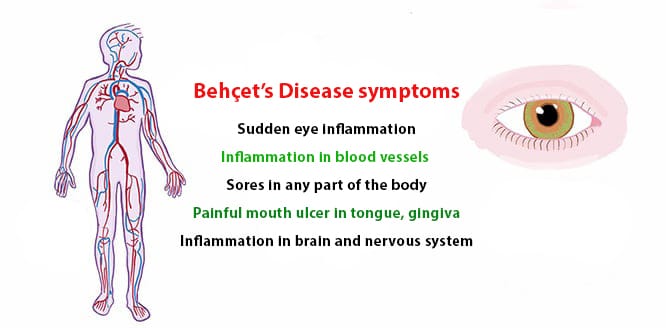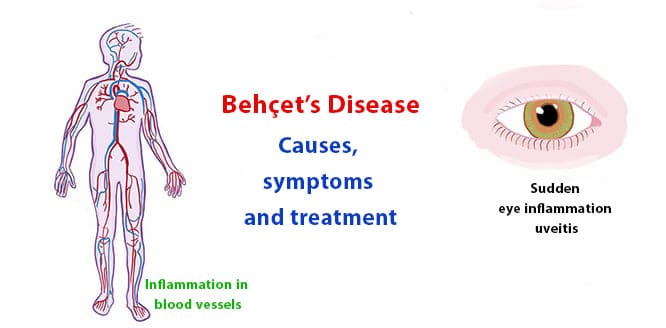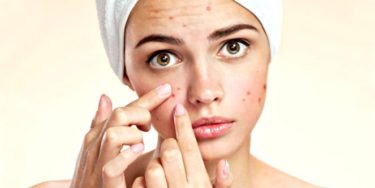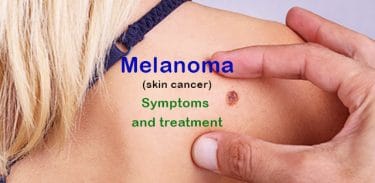Behçet’s Disease is a rare and chronic disease which causes inflammation in blood vessels. The exact cause of the disease has not been found yet; however, it is considered to be related to malfunctions in autoimmune system. Some of its symptoms are mouth sores, eye inflammation, skin rashes and genital sores. These symptoms seem to be unrelated to each other. Moreover, the symptoms can vary depending on the person. There is no certain diagnosis method. Therefore, symptoms have an important role on diagnosing the disease. For treatment, usually medications are used to reduce symptoms and prevent serious complications as blindness. Behçet’s Disease is not contagious.
Table of Contents
What is Behçet’s Disease?
Behçet’s Disease causes inflammation in small and large blood vessels. It is a rare and chronic disease; and is also difficult to be detected. It was named after Prof. Dr. Hulusi Behçet, who defined the disease. Usually, this disease starts in ages of 20s or 30s; but still, it can affect people from any age, any gender, or any ethnicity. Even though it is seen in the whole world, it is more common in Eastern Mediterranean, Middle East and Eastern Asia.
Causes of Behçet’s Disease
The certain cause of the disease is not known. Yet, it is considered to be caused by an autoimmune disorder. An autoimmune disorder is basically that the body attack its own healthy cells. Specialists think that in Behçet’s Disease, body mistakenly attacks blood vessels. Triggering problem is not obvious; but, genetic and environmental factors are considered to have impact on this. Some studies show that in people who have genes sensitive to Behçet’s Disease, a virus or bacteria can be triggering factor.
Risk factors of Behçet’s Disease
- Age: It usually affects people in their 20s or 30s, and both women and men. However, children and elderlies can have this disease, too.
- Countries with high risk: Turkey, Iran, Japan, China, and Middle East region.
- Gender: It can be seen in both women and men; but, it is usually more severe in men.
- Genes: Having some certain genes may increase the risk of developing the disease.

Symptoms of Behçet’s Disease
- Painful mouth ulcer in tongue, gingiva and inside of the cheek. They usually get better in a couple of weeks without any scar, but they mostly recur.
- Genital ulcer in scrotum in men, and in cervix, vulva or vagina in women. They cause pain and sometimes scars.
- Sores in any part of the body and looking like acne.
- Sudden eye inflammation (uveitis) causing painful redness and blurry vision
- Joint swelling and pain in knees, ankles, wrists, and hands
- Digestive system problems caused by stomach and intestine inflammation, such as stomachache, diarrhea, indigestion, vomiting, loss of appetite, bleeding
- Inflammation in brain and nervous system causing headache, double vision, fever, orientation and balance problems.
- Inflammation in blood vessels can sometimes create blood clots. When these clots occur in legs, it causes pain, swelling, sensitivity in legs, and heat and redness in skin. Blood clots occurring in legs mostly require immediate and urgent medical treatment.
- Blood clots can also occur in blood vessels in brain. In this case, patients can have severe headaches, hearing loss, double vision, muscle weakness or stroke.
- That blood vessels get weakened and creates large bulges is called aneurism. Pain in the limb, sudden and severe headaches, dizziness, hemoptysis (blood-spitting) and loss of consciousness are symptoms of aneurysm.
Symptoms of Behçet’s Disease vary depending on the person. They can disappear and then recur themselves. They can weaken by time. Severity depends on which parts of the body get affected by symptoms.
Complications of Behçet’s Disease
Complications depend on the symptoms of the disease. For instance, if uveitis is not treated, it can cause impairment in vision, and even blindness; or sores in genital area can become chronic if patient does not get a proper treatment.
Diagnosis of Behçet’s Disease
There is not a specific blood test or imaging technique to detect Behçet’s Disease. Therefore, doctors decide to diagnosis by taking symptoms into consideration. Also, some blood tests and other tests are done to eliminate the possibilities related to other diseases. For diagnostic purposes, there are some criteria of Behçet’s Disease; however, they are not always required. Doctors can use some other factors to diagnose. These are the diagnostic criteria:
Mouth sores
Mouth sores which are recurred at least 3 times in last 12 months is the main criterion for diagnosis since almost all patients have mouth sores. However, two more symptoms are also necessary for a complete diagnosis. These can be genital sores, painful redness in eyes, blurred vision or skin rashes.
Positive pathergy test
When the possibility of Behçet’s Disease becomes stronger, doctors may conduct a positive pathergy test to patients. This test reveals the extreme sensitivity of skin in patients, and a positive result means a diagnostic criterion for Behçet’s Disease. For this test, doctor checks whether needle prick induces an extreme reaction or not. If patient has Behçet’s Disease, skin pathergy reaction which is characterized by abnormal inflammation and a red bump under skin is observed. This shows that body overreacts to a small injury.
Treatment of Behçet’s Disease
Behçet’s Disease does not have a certain treatment. However, some treatments can be used to reduce symptoms and risk of serious complications. After diagnosis, patient can be referred to specialists having experiences related to treatment of Behçet’s Disease. Usually, rheumatologists manage the process. Since different symptoms can occur for different patients, each patient has a different treatment according to their symptoms. Treatment usually include use of different medications.
Depending on the severity and type of symptoms, some patients may need to take medications only in a severe period. On the other hand, if symptoms can cause severe complications such as blindness, then patient need to take medications for a long term.
Treatment for genital sores in Behçet’s Disease
To treat genital sores and skin lesions, topical creams are used. In addition to them, corticosteroid creams, anti-inflammatory medications or anesthetic creams can be used to reduce pain. Betamethasone creams are used to treat genital ulcer.
Treatment for mouth sores in Behçet’s Disease
Special mouthwashes including corticosteroids and other agents can be used to reduce pain caused by mouth sores. In mild cases, topical creams which are used for superficial tissues can be useful. For moderate and severe sores, mostly colchicine and azathioprine are used. Ignoring mouth hygiene increases the severity of Behçet’s Disease. Therefore, patients should give due consideration to this issue.
Treatment for eye involvement in Behçet’s Disease
For uveitis caused by Behçet’s Disease, cortisone, TNF inhibitors and drugs to suppress immune system are used. Anterior uveitis and retinal vasculitis can be treated by betamethasone eyedrops. Dexamethasone eyedrop is another medication to treat retinal vasculitis. Behçet’s Disease can cause other eye involvements than uveitis. Mostly, glaucoma caused by cortisone, cataract, sores inside of eyelid or xeropthalmia are seen in patients. Treatments depend on these symptoms and their severity.
Medications for Behçet’s Disease
Corticosteroids to control inflammation
Corticosteroids like Prednisone can reduce inflammation which is caused by Behçet’s Disease. When they are the only medications prescribed, symptoms tend to recur. Therefore, corticosteroids are mostly prescribed with another medication to suppress immune system activity. Corticosteroids have some side effects such as weight gain, permanent heartburn, high blood pressure and osteoporosis.
Medications suppressing the immune system
These medications reduce inflammation by preventing immune system to attack to healthy tissues. However, since they suppress the immune system, they can cause an increase in infection risk. Other side effects are troubles in liver and kidneys, low blood cell count and high blood pressure.
Medications changing the reaction of immune system
Intron A regulates the immune system activity to keep inflammation under control. This can be used as a single medication or with other medications in order to control skin lesions, joint pains and eye inflammations in patients with Behçet’s Disease. It has some side effects such as muscle pain and flu.
When aneurism is observed, surgical intervention may be necessary. Dissected vessels can be repaired by stents, which are small tubes. Medical treatment is also required to reduce the recurrence risk.
Pregnancy in patients with Behçet’s Disease
Behçet’s Disease usually does not affect fertility. However, it is important that patients should plan their pregnancy and get pregnant considering the doctors’ advices since most medications suppressing immune system can cause birth defects. Therefore, patients are advised to use at least one reliable birth control method until they decide to have kids. Doctors can tell the patient about the right time to get pregnant according to the course of disease. On the other hand, fertility in men with Behçet’s Disease can also be affected due to the disease itself or medications.
Is Behçet’s Disease fatal?
Usually, Behçet’s Disease is not fatal. However, if it develops in such regions as central nervous system, spinal cord or brain, then it can cause a death risk.
Tips for patients with Behçet’s Disease
- In steady periods of disease, spare time for yourself and have rest.
- Avoid stress since it can increase the severity of your symptoms.
- Small exercises such as walking or swimming can make you feel better in flaming periods. Also, exercises strengthen the body and help joints get flexible.
- Even if you do not have symptoms related to your eyes, go to an eye doctor for routine checks.
- Do not smoke and do not use alcohol.
- Have a healthy diet. Avoid fast food and other fatty foods since these can affect your blood vessels negatively.
- If you use corticosteroids, consume foods with high calcium to protect your bones, and have low calorie foods in order to avoid weight gain.
- Since Behçet’s Disease is a chronic one, accept this disease as a life style, and be open to have a psychological support if you need it.





can I have the reference that you took the information from ? I need to make a search about it ?